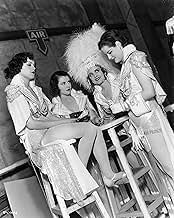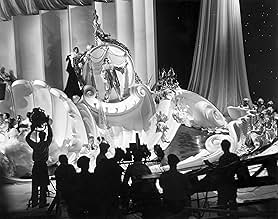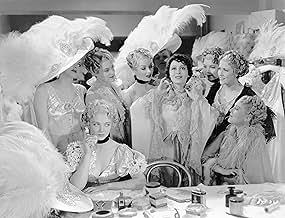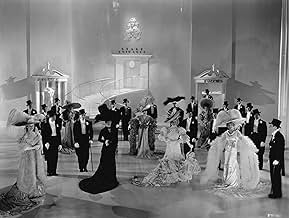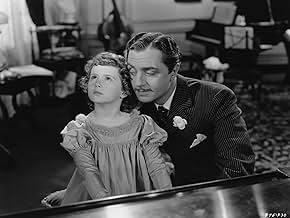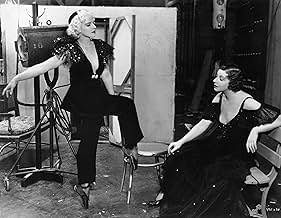CALIFICACIÓN DE IMDb
6.6/10
9.5 k
TU CALIFICACIÓN
Las desventuras de Florenz Ziegfeld Jr., conocido productor del espectáculo.Las desventuras de Florenz Ziegfeld Jr., conocido productor del espectáculo.Las desventuras de Florenz Ziegfeld Jr., conocido productor del espectáculo.
- Ganó 3 premios Óscar
- 8 premios ganados y 5 nominaciones en total
Fanny Brice
- Fannie Brice
- (as Fannie Brice)
Joseph Cawthorn
- Dr. Ziegfeld
- (as Joseph Cawthorne)
- Dirección
- Guionista
- Todo el elenco y el equipo
- Producción, taquilla y más en IMDbPro
Opiniones destacadas
This movie is worthwhile viewing for any fan of classic cinema or William Powell, but over 73 years later it's hard to see why this film won Best Picture of 1936 and a film like "Dodsworth" lost. Today it does seem overly long on musical numbers that could have been cut and short on storyline. There are probably several reasons that the picture could have been better and wasn't, the primary reason being that at the time the film was made Ziegfeld had only been dead four years and was thus still fondly and recently remembered. Also, according to the little featurette that comes with the DVD, Ziegfeld's widow Billie Burke was heavily involved in the making of the film and wouldn't allow anything in it to besmirch his memory. Finally, the production code had just begun to be sternly enforced in 1934, making a true accounting of Ziegfeld's personal life pretty much impossible. As a result Ziegfeld is portrayed as just the unluckiest of fellows who is always being wrongly perceived as a ladies' man just because his business involves large numbers of chorines.
In fact, Ziegfeld cheated on both wives incessantly, and Ziegfeld never even formally married Anna Held to begin with - instead they had a common law marriage according to the statutes of New York. However, none of these other factors can account for the complete lack of chemistry between Powell (Ziegfeld) and Loy (as Billie Burke) in the film. Considering how the two had already been in several movies together by the time this film was made, and that they never failed to sparkle on screen together in the other movies, there must have been either a complete lack of direction or over-direction to wind up with the rather wooden performance that results whenever the two are in scenes together.
This movie would probably rate only about 6/10 if it wasn't for William Powell's performance. Marvelous as always, he was at least allowed to portray Ziegfeld as the cagey trickster and gambler with tremendous class that he was, and he absolutely makes the film. I can't think of any other actor of that time period who could have done as good a job.
In fact, Ziegfeld cheated on both wives incessantly, and Ziegfeld never even formally married Anna Held to begin with - instead they had a common law marriage according to the statutes of New York. However, none of these other factors can account for the complete lack of chemistry between Powell (Ziegfeld) and Loy (as Billie Burke) in the film. Considering how the two had already been in several movies together by the time this film was made, and that they never failed to sparkle on screen together in the other movies, there must have been either a complete lack of direction or over-direction to wind up with the rather wooden performance that results whenever the two are in scenes together.
This movie would probably rate only about 6/10 if it wasn't for William Powell's performance. Marvelous as always, he was at least allowed to portray Ziegfeld as the cagey trickster and gambler with tremendous class that he was, and he absolutely makes the film. I can't think of any other actor of that time period who could have done as good a job.
This film was shown on TCM recently, in the DVD format, since it has an overture and a few minutes of "exit music". The copy was excellent, as it has been greatly restored as it looks extremely smooth to the eye.
Florenz Ziegfield was one of the most brilliant producers of this country at the end of the 19th and beginning of the 20th centuries. He had an eye for what worked on a stage. He was also the discoverer of a lot of the talent that went to have enormous careers of their own, long after they appeared in one of Mr. Ziegfeld's extravaganzas.
Robert Z. Leonard in directing this film had a lot of contributors, no doubt, but it's probably Adrian, the costume designer par excellence that gave this movie a lot of class by recreating for the screen some of the costumes that were associated with Ziegfeld.
William Powell portrays the great Ziegfeld. Mr. Powell is amazing in his interpretation of the creative man on the screen. He is this man he is playing on the screen; he is totally convincing he was born to play the role.
Actually the film leaves a lot of things unexplained. We know that Anna Held is out of the picture, after her divorce, but nothing is mentioned that she had died at all. Also, the relationship with his second wife, Billie Burke, comes as an afterthought since she only appears in the last part of the movie.
Luise Ranier made a compelling Anna Held, the French actress, who obviously never understood her husband, even though it's clear she loved him. She appears as a complete insecure person, never knowing what to do, or what to decide on. As far as the Oscar she won for playing this role, it eludes my comprehension, or maybe that year her competition must have been poor.
Myrna Loy as Billie Burke gives a radiant performance. She was always a convincing actress and in the film she demonstrates her versatility in playing a musical comedy star. The young Myrna Loy was a gorgeous creature, as proven in this film.
The costumes from some of the musical numbers are incredible. Of course, they were made to suit the theatricality of whatever Mr. Ziegfeld presented. Such extravagant numbers will never be presented on a Broadway stage ever again as the cost would be prohibitive.
Virginia Bruce, Frank Morgan, Ray Bolger, Fanny Brice appear in the film, but of course, the picture is dominated by William Powell from beginning to end.
Florenz Ziegfield was one of the most brilliant producers of this country at the end of the 19th and beginning of the 20th centuries. He had an eye for what worked on a stage. He was also the discoverer of a lot of the talent that went to have enormous careers of their own, long after they appeared in one of Mr. Ziegfeld's extravaganzas.
Robert Z. Leonard in directing this film had a lot of contributors, no doubt, but it's probably Adrian, the costume designer par excellence that gave this movie a lot of class by recreating for the screen some of the costumes that were associated with Ziegfeld.
William Powell portrays the great Ziegfeld. Mr. Powell is amazing in his interpretation of the creative man on the screen. He is this man he is playing on the screen; he is totally convincing he was born to play the role.
Actually the film leaves a lot of things unexplained. We know that Anna Held is out of the picture, after her divorce, but nothing is mentioned that she had died at all. Also, the relationship with his second wife, Billie Burke, comes as an afterthought since she only appears in the last part of the movie.
Luise Ranier made a compelling Anna Held, the French actress, who obviously never understood her husband, even though it's clear she loved him. She appears as a complete insecure person, never knowing what to do, or what to decide on. As far as the Oscar she won for playing this role, it eludes my comprehension, or maybe that year her competition must have been poor.
Myrna Loy as Billie Burke gives a radiant performance. She was always a convincing actress and in the film she demonstrates her versatility in playing a musical comedy star. The young Myrna Loy was a gorgeous creature, as proven in this film.
The costumes from some of the musical numbers are incredible. Of course, they were made to suit the theatricality of whatever Mr. Ziegfeld presented. Such extravagant numbers will never be presented on a Broadway stage ever again as the cost would be prohibitive.
Virginia Bruce, Frank Morgan, Ray Bolger, Fanny Brice appear in the film, but of course, the picture is dominated by William Powell from beginning to end.
Long but well worth hanging in there for. Luise Rainer gives an outstanding well-deserved Oscar winning performance as Anna Held. The first half of the movie which covers the period of Ziegfeld's marriage to Held is the better half of the movie. Great re-enactment of stage Follies productions. 9 out of 10.
Knowing several people, on and outside of IMDb, who consider The Great Ziegfeld one of the weakest Best Picture winners, that didn't stop me from seeing it anyway. To me though, while it's not flawless and not the best film of the year it was still incredibly well-made and entertaining stuff and from personal view it is nowhere near one of the worst Best Picture winners.
The Great Ziegfeld agreed is overlong with a draggy and at times uneventful first half and half an hour could easily have been trimmed. And more could have done with the relationship between Ziegfeld and Billie Burke which appeared late in the film and didn't feel developed enough, almost like an afterthought.
However, The Great Ziegfeld is very lavishly mounted, with photography that's both beautiful and clever, sumptuous costume design and some of the most handsomely gorgeous sets of any 30s musical. Other pleasures are the marvellous and very well-staged(without being too overblown) songs with A Pretty Girl is Like a Melody being an absolute show-stopper, a script peppered with humour and heart and the mostly poignant story. Standout scenes were Fanny Brice's charming My Man, Ray Bolger's witty dancing to My Follies Girl, Luise Rainer's heart-breaking telephone(justifiably famous) and especially A Pretty Girl is Like a Melody with its clever photography and perhaps one of the best uses of a staircase in a film. The direction is adept and the performances are great, with William Powell suave personified and especially Luise Rainer who is the epitome of charm and grace, capable of a good range of emotions as seen in the telephone scene. Fanny Brice, Frank Morgan, Ray Bolger are all memorable, while Myrna Loy is underused she's hardly wasted either.
Overall, a well-made, entertaining and very good film and well worth the look. 8/10 Bethany Cox
The Great Ziegfeld agreed is overlong with a draggy and at times uneventful first half and half an hour could easily have been trimmed. And more could have done with the relationship between Ziegfeld and Billie Burke which appeared late in the film and didn't feel developed enough, almost like an afterthought.
However, The Great Ziegfeld is very lavishly mounted, with photography that's both beautiful and clever, sumptuous costume design and some of the most handsomely gorgeous sets of any 30s musical. Other pleasures are the marvellous and very well-staged(without being too overblown) songs with A Pretty Girl is Like a Melody being an absolute show-stopper, a script peppered with humour and heart and the mostly poignant story. Standout scenes were Fanny Brice's charming My Man, Ray Bolger's witty dancing to My Follies Girl, Luise Rainer's heart-breaking telephone(justifiably famous) and especially A Pretty Girl is Like a Melody with its clever photography and perhaps one of the best uses of a staircase in a film. The direction is adept and the performances are great, with William Powell suave personified and especially Luise Rainer who is the epitome of charm and grace, capable of a good range of emotions as seen in the telephone scene. Fanny Brice, Frank Morgan, Ray Bolger are all memorable, while Myrna Loy is underused she's hardly wasted either.
Overall, a well-made, entertaining and very good film and well worth the look. 8/10 Bethany Cox
Boy, is this movie long......but worth it for the most part. William Powell is, as usual, his urbane, sophisticated self in a romanticized portrayal of Florenz Ziegfeld. Myrna Loy,leaving behind her wisecracking Nora Charles persona, does a fair job as Billie Burke. Burke, whose movie career was based on dithering, silly women, was once a beauty who graced the Follies. Loy doesn't come across as either but she has never given a bad performance so she is believable. But Louise Rainer as Anna Held is the one to watch here. A beautiful doll-like creature, she enchants you with her performance. The famous telephone scene may be overrated somewhat but it worked for me....and obviously for the Academy...it garnered her an Oscar. The music is so wonderful and the "Pretty Girl is Like a Melody" with Dennis Morgan is eye candy. One glaring fault is that there is a very short sequence with the great Fanny Brice in which she is singing "My Man" ( probably one of the greatest torch songs of all times) and it is just cut-off in mid warble as the story goes on to another scene. An unforgivable sin!! There could have been a little less talk and a little more singing/dancing in the movie but since it is a biography and not primarily a musical, all, except for the Brice faux pas, is forgiven!
Oscars Best Picture Winners, Ranked
Oscars Best Picture Winners, Ranked
See the complete list of Oscars Best Picture winners, ranked by IMDb ratings.
¿Sabías que…?
- TriviaA.A. Trimble, who portrays Will Rogers in the film, was a Cleveland map salesman who frequently impersonated Rogers at Rotarian lunches.
- ErroresIn the "Rhapsody in Blue" portion of the mammoth "Pretty Girl" number, one of the silver-fringe-and-antlers quartet of dancers gets visibly disoriented when her group does its final moves. She's the second one from the left, and her movements are completely out of sync with the other three until, with a thump, she sits down on the stairs. Since the incredibly complex number was shot in very long takes, the error was allowed to remain in the film.
- Citas
Florenz Ziegfeld Jr.: [after catching Ray Bolger doing a little softshoe backstage] Buddy, you're better with your feet than you are with your broom.
Ray Bolger: Mr. Ziegfeld, you think so? Gee, I wish you'd give me a chance. I've got talent, and I'd like to get away from shifting scenery and moving props.
Florenz Ziegfeld Jr.: How long have you been a property boy?
Ray Bolger: Five years, but my heart hasn't been in it.
Florenz Ziegfeld Jr.: You've been working a long time without your heart, buddy.
- Créditos curiososThe opening credits display the title of the film and the names of the stars in marquee lights, as they would be on Broadway.
- Versiones alternativasThere is an Italian edition of this film, as Bonus Extra, on DVD "FOLLIE DI ZIEGFELD", re-edited with the contribution of film historian Riccardo Cusin. This version is also available for streaming on some platforms.
- ConexionesEdited into Las follies de Ziegfield (1941)
- Bandas sonorasHarriet Hoctor Ballet
(1936) (uncredited)
(also called "A Circus Must Be Different in a Ziegfield Show")
Music by Con Conrad
Lyrics by Herb Magidson
Sung and danced by male and female choruses
Danced by Harriet Hoctor
Selecciones populares
Inicia sesión para calificar y agrega a la lista de videos para obtener recomendaciones personalizadas
- How long is The Great Ziegfeld?Con tecnología de Alexa
Detalles
- Tiempo de ejecución
- 2h 56min(176 min)
- Color
- Relación de aspecto
- 1.37 : 1
Contribuir a esta página
Sugiere una edición o agrega el contenido que falta


